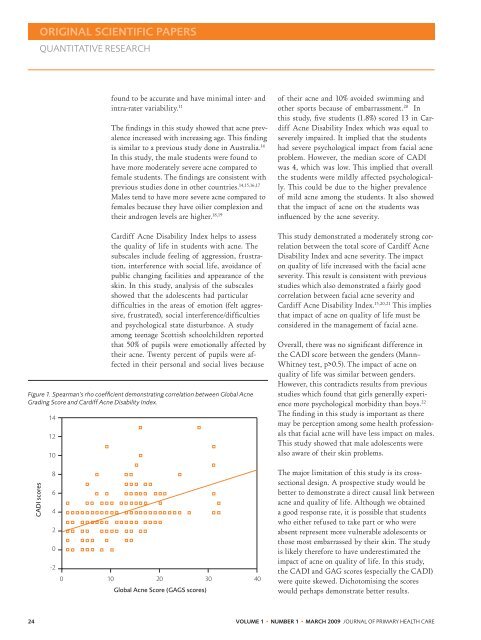entire issue. - The Royal New Zealand College of General ...
entire issue. - The Royal New Zealand College of General ...
entire issue. - The Royal New Zealand College of General ...
Create successful ePaper yourself
Turn your PDF publications into a flip-book with our unique Google optimized e-Paper software.
ORIGINAL SCIENTIFIC PAPERS<br />
qUANTITATIVE RESEARCH<br />
found to be accurate and have minimal inter- and<br />
intra-rater variability. 11<br />
<strong>The</strong> findings in this study showed that acne prevalence<br />
increased with increasing age. This finding<br />
is similar to a previous study done in Australia. 14<br />
In this study, the male students were found to<br />
have more moderately severe acne compared to<br />
female students. <strong>The</strong> findings are consistent with<br />
previous studies done in other countries. 14,15,16,17<br />
Males tend to have more severe acne compared to<br />
females because they have oilier complexion and<br />
their androgen levels are higher. 18,19<br />
Cardiff Acne Disability Index helps to assess<br />
the quality <strong>of</strong> life in students with acne. <strong>The</strong><br />
subscales include feeling <strong>of</strong> aggression, frustration,<br />
interference with social life, avoidance <strong>of</strong><br />
public changing facilities and appearance <strong>of</strong> the<br />
skin. In this study, analysis <strong>of</strong> the subscales<br />
showed that the adolescents had particular<br />
difficulties in the areas <strong>of</strong> emotion (felt aggressive,<br />
frustrated), social interference/difficulties<br />
and psychological state disturbance. A study<br />
among teenage Scottish schoolchildren reported<br />
that 50% <strong>of</strong> pupils were emotionally affected by<br />
their acne. Twenty percent <strong>of</strong> pupils were affected<br />
in their personal and social lives because<br />
Figure 1. Spearman’s rho coefficient demonstrating correlation between Global Acne<br />
Grading Score and Cardiff Acne Disability Index.<br />
<strong>of</strong> their acne and 10% avoided swimming and<br />
other sports because <strong>of</strong> embarrassment. 20 In<br />
this study, five students (1.8%) scored 13 in Cardiff<br />
Acne Disability Index which was equal to<br />
severely impaired. It implied that the students<br />
had severe psychological impact from facial acne<br />
problem. However, the median score <strong>of</strong> CADI<br />
was 4, which was low. This implied that overall<br />
the students were mildly affected psychologically.<br />
This could be due to the higher prevalence<br />
<strong>of</strong> mild acne among the students. It also showed<br />
that the impact <strong>of</strong> acne on the students was<br />
influenced by the acne severity.<br />
This study demonstrated a moderately strong correlation<br />
between the total score <strong>of</strong> Cardiff Acne<br />
Disability Index and acne severity. <strong>The</strong> impact<br />
on quality <strong>of</strong> life increased with the facial acne<br />
severity. This result is consistent with previous<br />
studies which also demonstrated a fairly good<br />
correlation between facial acne severity and<br />
Cardiff Acne Disability Index. 15,20,21 This implies<br />
that impact <strong>of</strong> acne on quality <strong>of</strong> life must be<br />
considered in the management <strong>of</strong> facial acne.<br />
Overall, there was no significant difference in<br />
the CADI score between the genders (Mann–<br />
Whitney test, p>0.5). <strong>The</strong> impact <strong>of</strong> acne on<br />
quality <strong>of</strong> life was similar between genders.<br />
However, this contradicts results from previous<br />
studies which found that girls generally experience<br />
more psychological morbidity than boys. 22<br />
<strong>The</strong> finding in this study is important as there<br />
may be perception among some health pr<strong>of</strong>essionals<br />
that facial acne will have less impact on males.<br />
This study showed that male adolescents were<br />
also aware <strong>of</strong> their skin problems.<br />
<strong>The</strong> major limitation <strong>of</strong> this study is its crosssectional<br />
design. A prospective study would be<br />
better to demonstrate a direct causal link between<br />
acne and quality <strong>of</strong> life. Although we obtained<br />
a good response rate, it is possible that students<br />
who either refused to take part or who were<br />
absent represent more vulnerable adolescents or<br />
those most embarrassed by their skin. <strong>The</strong> study<br />
is likely therefore to have underestimated the<br />
impact <strong>of</strong> acne on quality <strong>of</strong> life. In this study,<br />
the CADI and GAG scores (especially the CADI)<br />
were quite skewed. Dichotomising the scores<br />
would perhaps demonstrate better results.<br />
24 VOLUME 1 • NUMBER 1 • MARCH 2009 J OURNAL OF PRIMARY HEALTH CARE

















